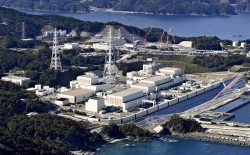
The moon is seen in the night sky in October 2022.
17:26 JST, January 10, 2023
WASHINGTON — The Japanese and U.S. governments aim to sign a comprehensive accord for cooperation in space development projects during Prime Minister Fumio Kishida’s visit to Washington for a Friday summit with U.S. President Joe Biden, according to sources in the two governments.
It is expected that Japan and the United States will have opportunities to collaborate more often on projects such as the Artemis Plan, a U.S.-led campaign for manned exploration of the moon, in which Japan is also to take part.
With China accelerating its own space development projects, the two governments judged it necessary to enhance the basis of Japan-U.S. cooperation with the comprehensive accord.
It is likely the accord will be agreed on during the Kishida-Biden summit, and that it will then signed by Foreign Minister Yoshimasa Hayashi and U.S. Secretary of State Antony Blinken by the end of Friday, with Kishida present.
The accord takes the form of a framework. It stipulates mutual affairs about space development. For example, if a Japanese space probe causes some damage to the U.S. side or vice versa, the two countries will not demand compensation from each other.
The United States has already signed similar accords with other countries, including France.
Past accords on space issues between the Japanese and U.S. governments decided the details of particular individual cases.
The comprehensive accord this time covers all aspects of bilateral space development cooperation, making it unnecessary to sign ad hoc accords each time. It is expected to accelerate bilateral cooperation.
In the Artemis Plan, the United States aims for a manned landing on the moon in or after 2025. Japan will play a large role in the plan.
It is planned that Japan will be in charge of development of a highly advanced lunar rover inside of which astronauts can conduct activities without the encumbrance of spacesuits.
The Japanese government aims for Japanese astronauts to land on the moon in the latter half of the 2020s. Cooperation from the United States is essential for that goal.
In December last year, the United States succeeded in carrying out an unmanned return trip of the Orion, the latest U.S. spacecraft intended for lunar exploration.
That was the first step of the Artemis Plan, one that makes it more feasible to realize manned flights to the moon.
The Biden administration also regards Japan as an important partner in space development fields.
In responses to climate change, which is a key policy concern of the Biden administration, the U.S. government wants to enhance collaboration with Japan in such projects as satellite observation of rainfall.
Top Articles in Politics
-

Japan PM Takaichi’s Cabinet Resigns en Masse
-

Sanae Takaichi Elected 105th Prime Minister of Japan; Keeps All Cabinet Appointees from Previous Term
-

Japan’s Govt to Submit Road Map for Growth Strategy in March, PM Takaichi to Announce in Upcoming Policy Speech
-

LDP Wins Historic Landslide Victory
-

LDP Wins Landslide Victory, Secures Single-party Majority; Ruling Coalition with JIP Poised to Secure Over 300 seats (UPDATE 1)
JN ACCESS RANKING
-

Japan PM Takaichi’s Cabinet Resigns en Masse
-

Japan Institute to Use Domestic Commercial Optical Lattice Clock to Set Japan Standard Time
-

Israeli Ambassador to Japan Speaks about Japan’s Role in the Reconstruction of Gaza
-

Man Infected with Measles Reportedly Dined at Restaurant in Tokyo Station
-

Man Infected with Measles May Have Come in Contact with Many People in Tokyo, Went to Store, Restaurant Around When Symptoms Emerged


















